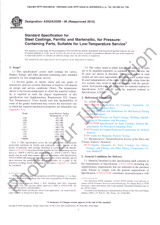Wir benötigen Ihre Einwilligung zur Verwendung der einzelnen Daten, damit Sie unter anderem Informationen zu Ihren Interessen einsehen können. Klicken Sie auf "OK", um Ihre Zustimmung zu erteilen.
ASTM F1588-96(2019)
Standard Test Method for Constant Tensile Load Joint Test (CTLJT)
Name übersetzen
NORM herausgegeben am 1.11.2019
Informationen über die Norm:
Bezeichnung normen: ASTM F1588-96(2019)
Ausgabedatum normen: 1.11.2019
SKU: NS-975377
Zahl der Seiten: 5
Gewicht ca.: 15 g (0.03 Pfund)
Land: Amerikanische technische Norm
Kategorie: Technische Normen ASTM
Kategorie - ähnliche Normen:
Die Annotation des Normtextes ASTM F1588-96(2019) :
Keywords:
constant tensile load, mechanical fitting, mechanical joint, polyethylene gas pipe, pull-out, tensile test,, ICS Number Code 23.040.20 (Plastic pipes)
Ergänzende Informationen
| Significance and Use | ||||||||||||||
|
5.1 This test method was designed to be used to validate the long-term resistance to pullout of joints designed for use in plastic natural gas piping systems. 5.2 This test method is used in addition to the short-term tests required by OPS Part 192.283b, Title 49. Informal versions of this test method are used by manufacturers and utilities to demonstrate that a joint is resistant to the effects of long-term creep and meets the requirements for classification as a Category 1 or a Category 3 joint in accordance with Specification D2513. 5.3 This test method may also be applicable for the determination of the effects of a sustained axial load on joints or other components of plastic piping systems designed for other applications. Test parameters and the internal pressurizing fluid, if any, should be listed in the referencing document. 5.4 Documents that reference this test method for products other than joints shall specify test conditions and performance requirements. In general, such products pass this test if they maintain their structural integrity, do not leak, and perform to specification during and after the test. |
||||||||||||||
| 1. Scope | ||||||||||||||
|
1.1 The constant tensile load joint test (CTLJT) is designed to demonstrate that a joint in a plastic piping system is resistant to the effects of long-term creep. 1.1.1 The joint is subjected to an internal pressure at least equal to its operating pressure and a sustained axial tensile load for a specified time period, usually 1000 h. The joint shall not leak, nor may the pipe completely pull out for the test duration. The total axial stress is set by the referencing document. 1.1.2 Some typical conditions for testing of joints on polyethylene pipe are described in Appendix X1. 1.2 This test is usually performed at 73 °F (22.8 °C). 1.3 The CTLJT was developed to demonstrate the long-term resistance to pullout of mechanical joints on polyethylene gas pipe. The CTLJT has also been successfully applied to the evaluation of other components of plastic piping systems. These applications are discussed in Appendix X1. 1.4 The values stated in inch-pound units are to be regarded as standard. The values given in parentheses are mathematical conversions to SI units that are provided for information only and are not considered standard. 1.5 This standard does not purport to address all of the safety concerns, if any, associated with its use. It is the responsibility of the user of this standard to establish appropriate safety, health, and environmental practices and determine the applicability of regulatory limitations prior to use. 1.6 This international standard was developed in accordance with internationally recognized principles on standardization established in the Decision on Principles for the Development of International Standards, Guides and Recommendations issued by the World Trade Organization Technical Barriers to Trade (TBT) Committee. |
||||||||||||||
| 2. Referenced Documents | ||||||||||||||
|
Empfehlungen:
Aktualisierung der technischen Normen
Wollen Sie sich sicher sein, dass Sie nur die gültigen technischen Normen verwenden?
Wir bieten Ihnen eine Lösung, die Ihnen eine Monatsübersicht über die Aktualität der von Ihnen angewandten Normen sicher stellt.
Brauchen Sie mehr Informationen? Sehen Sie sich diese Seite an.




 Cookies
Cookies
